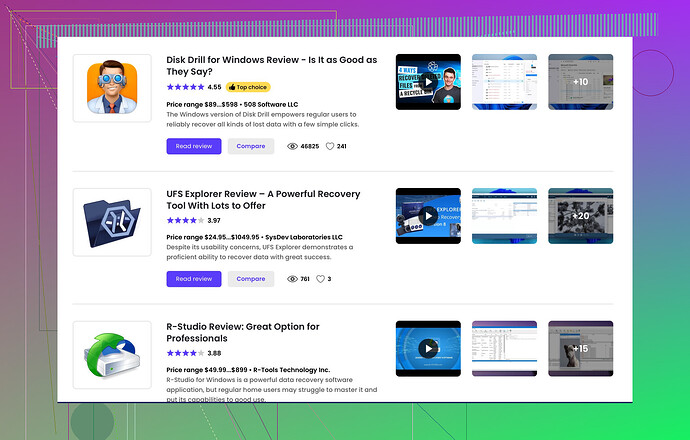I accidentally deleted some important photos from my SD card and need them back. Can anyone recommend reliable software for recovering deleted photos? Thanks!
Oh no, losing photos is such a pain. I’ve been there! I’ve tried a few different photo recovery tools, and I’ll share what worked for me.
First off, check out Disk Drill. It’s one of the best recovery software out there for both Windows and Mac. It’s user-friendly and does a thorough job of scanning your SD card to recover deleted files. Last time I used it, I got back almost everything I thought was lost forever.
Another solid option is Recuva, which is great for beginners since it has a simple interface and guide. It's free, though there's a pro version with extra features, but the free one usually gets the job done.If you’re willing to spend a bit, PhotoRec is a beast. It’s a bit more technical and not as visually appealing, but it’s super effective. Just a warning though, be prepared to mess around with command lines if you go this route.
And if none of these quite fit your needs, you could try Stellar Photo Recovery or EaseUS Data Recovery Wizard. They are also pretty reliable and have saved my bacon once or twice.
Bottom line: start with Disk Drill. It hits the sweet spot between ease of use and effectiveness. Good luck!
Oof, accidentally deleting photos is the worst! @nachtschatten has already covered some great tools like Disk Drill, Recuva, and PhotoRec. Let me throw in a couple of others that might help too.
One I’d recommend is MiniTool Power Data Recovery. It’s pretty user-friendly and efficient, even for those not super tech-savvy. I’ve used it once to recover some files from a corrupted SD card, and it worked like a charm. It also offers a free version that can recover up to 1 GB of data.
Another option is R-Studio. It’s definitely more on the advanced side, like PhotoRec, and might be overkill for just photo recovery, but it packs a punch when it comes to deep scanning and file recovery.
If you’re more into ease-of-use territory, Wondershare Recoverit might be your cup of tea. It has a sleek interface and guides you through the recovery process step-by-step, which can be a big relief when you’re panicking over lost photos.
Lastly, don’t forget to consider TestDisk & PhotoRec. Yes, PhotoRec does get complex with command lines, but it’s part of a package that includes TestDisk, which can help you recover partitions and fix disk structure issues. This duo has proven to be powerful, though it requires a bit of tech know-how.
To sum it up, start with something user-friendly like Disk Drill or MiniTool, and if those don’t work, you can dig into the more technical tools like R-Studio or PhotoRec.
Best data recovery software on Reddit
For more insights and real user experiences, check out discussions on the best data recovery software on Reddit. This community shares tons of tips and personal reviews that could be super helpful.
Hang in there!
Alright, let’s dive in. You’ve got two really solid recommendations from @cazadordeestrellas and @nachtschatten already. Allow me to add another layer to this.
While Disk Drill is often crowned for its balance of user-friendly interface and effectiveness, there are some points to consider. Pros: It’s intuitive, supports various file formats, and boasts quick and deep scan options. Cons: The free version limits recovery to 500MB – if you’ve got a lot of pics, you might need to pony up for a premium version.
Now, let’s talk alternatives. Over at @nachtschatten’s list, Recuva and PhotoRec stand out. I’ll admit, Recuva’s simplicity is a huge plus for beginners. It’s like the fast food of recovery tools – quick, no-nonsense, gets the job done. But it might not always recover everything.
For the tech-savvy, PhotoRec is your go-to but remember it’s like your grandma’s vintage car – powerful yet needs a bit more elbow grease.
Here are a few you might not have heard about:
- Recoverit by Wondershare – Sleek, modern UI, and step-by-step assistance.
- MiniTool Power Data Recovery – Great for corrupted SD cards and under 1GB free recovery.
- R-Studio – High-end; think of it like a Swiss Army knife for recovery; more technical but extensive in its abilities.
For a straightforward approach:
- Try Disk Drill first, assess its ease of use.
- Recuva as a great free second option.
- Go techy with PhotoRec if those don’t meet your needs.
Bottom line: If you want simplicity and efficiency without much hassle, stick with Disk Drill. If you’re tech-enterprising, dive deeper into PhotoRec or R-Studio. And hey, if Disk Drill’s 500MB limit is a deal-breaker, at least you’ve got other robust options!
